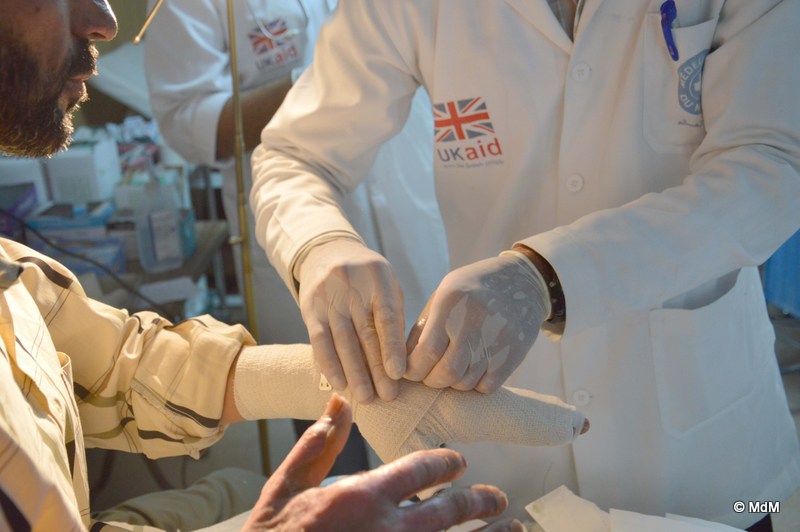“My son was staring at me while I was burning.” Samer

Domestic accidents can have serious consequences on individuals and families. Such consequences can be exacerbated by the situation and the environment of the victims: how can a person with no financial means pay the required treatment? For Samer, the question was more like: how will I now provide for my family?
In one of the bungalow of MdM primary health care clinic in Zaatari is a man sitting on a bed. He is quietly levering his two arms while a nurse is busily changing bandages: he was burned to the third degree after a gas bottle exploded and totally destroyed his home. “My son was staring at me while I was burning. He was shouting “Dad is burning! Dad is burning!” He didn’t run away with his siblings, he just stayed there” recalls Samer.
The carpenter has been coming every day since his admission to MdM clinic to have his arms and face dressed under the care of Dr. Zein. “When my patient first came I told him you have to go to hospital. He refused to listen and insisted. He wanted to be treated here… He explained to me that he went to a hospital and they couldn’t admit him as it was overloaded. I had to accept Samer under my care because there was no other option and his case is serious: I could not let him like that” says Dr. Zein.
According to the medical practitioner, third degree burns on hand and face are criteria of admission in hospitals’ burn unit. In normal circumstances, Samer would have been treated in such a unit: his wounds would have been dressed every 6 hours for at least two weeks in order to regenerate the skin after which he would have pursued his treatment in an outpost clinic. However this is not the case of Samer and his treatment will last longer. “We do our best with the available means. Our main aim is to have Samer recover the complete use of his hands and be able to work normally. We make sure his skin regenerates properly in order to avoid what we call claw fingers: it happens when the skin becomes very hard and prevents the movement of the fingers. This can be avoided by taking care of the burn and physiotherapy” explains Dr. Zein. When his treatment will be completed, Ibrahim will be referred to the organization Handicap International to follow physiotherapy sessions.
The nurse is now gently washing and massaging Samer’s face with gauze. It was burned too but to a lesser degree. “I am removing the dead tissues on the face by applying this wet gauze. It also helps to relax the skin and the muscles” explains Amjad. According to the medical team, Samer’s first concern was his appearance when he came. “Patients who come to see us are sometimes depressed: they have no work or no relations. We provide them with treatment but also with psychosocial support: we interact with them and show interest in them. We build a trust relationship which allows the physical treatment to be successful. If the patient is not convinced by our work and don’t trust us, it will be difficult to treat this person” adds Faraj, also nurse.
Amjad and Faraj now joke with Samer and his four-year-old son. The little boy was burned on his right arm and shoulder during the accident. Unlike his father he was admitted to the hospital as his burns were less severe. He was recently discharged and follows now his treatment at MdM clinic. Amjad is applying a cream on the wound: the skin regenerated properly and the little boy is recovering fastly.
Recovering the use of both hands is vital for Samer and his family. Carpenter and father of 8 children, he is the sole bread-winner of his family. He and his son were the only one physically injured however the accident he suffered from jeopardized the safety of his whole family: how would they make ends meet?
Jordan is welcoming over 600,000[1] Syrians who fled violence in their home country and who have registered at the UNHCR. According to Jordanian authorities, there would be around a million Syrians present on its soil. The sudden presence of so many Syrian refugees seriously impacts the Jordanian health system as it cannot cope with the high demand in terms of available services and their quality. Médecins du Monde helps alleviate this burden by providing primary health care services to Syrian refugees and vulnerable Jordanians through two clinics in Zaatari camp and a clinic in Ramtha town